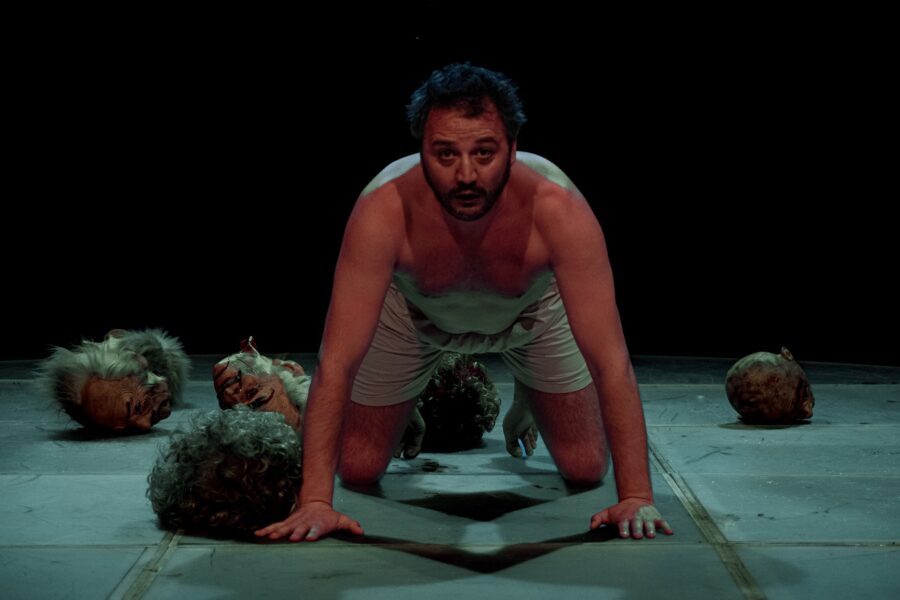National Theatre of Kosovo, premiere 19 March 2024
The Traitor’s Niche, Ismail Kadare’s 1978 novel about the life of the rebel Ottoman Albanian leader Ali Pasha, was published when Albania was still under communist rule. Since the novel explores life within the totalitarian Ottoman Empire of the 19th century, it was banned from bookstores in Enver Hoxha’s repressive Albania.
Doruntina Basha’s dramatization, directed by Kushtrim Koliqi, is a captivating and – mostly – coherent retelling of Kadare’s novel, which includes some intriguing modern additions and approaches.
The plot concerns the rebellion of Ali Tepelena, who, in the declining years of the Ottoman Empire, rose up against the Sultan. The Sultan then took brutal and repressive measures to prevent future rebellion. As played by Ylber Bardhi, the Sultan is weak man, reliant on an advisor/PR consultant, played by Gresa Pallaska, who instructs him on how to be an effective ruler in public. This character does not exist in the book, and one might easily mistake her for the Sultan’s wife as she has a closeness to him that goes beyond the professional level.
In his voice and mannerisms, Bardhi plays the Sultan as a broadly comic character, more closely resembling Aladdin than the powerful emperor he is, with his light pink harem pants, burgundy suit jacket, and fancy white shirt.
Adrian Morina plays Abdulla, the supervisor of the niche who has been charged with the responsibility of ensuring that the human heads on display do not disintegrate too quickly. He inspects them on a daily basis, their display a grim representation of the terrifying power of the Ottoman Empire. Morina is masterful in this role, creating a sympathetic portrait of a man haunted by his brutal work, as dead inside as the heads to which he tends.
The depiction of the psychological horror and trauma experienced by Abdulla is the most effective aspect of the production, showing the toll of bearing witness to the physical harm of other humans. Morina is skilful in conveying his distorted state of mind and this is amplified by the projections of distorted faces on digital screens around the stage.
Traitors are beheaded by Tundj Hata (Armend Smajli, who captures the callousness of his character) the imperial courier who ceremoniously displays the heads of traitors in the public square in Istanbul. Smajli’s character is so malevolent he drinks his victims’ blood and even seems to derive sexual gratification from this. Ali Pasha, meanwhile, is played gracefully by Bislim Muçaj as someone who, from the isolation of his fortress, fully expects that the Albanians will follow him like they did with Skanderbeg.

Adrian Morina in The Traitor’s Niche. Photo: Enkela Ukshini
Koliqi also has three actors play a kind of maintenance team of the niche, walking around robotically, but other than bringing a modern element to the piece, it was not very clear what the intention was here.
Bekim Korça’s set design resembles a giant tambourine on which all the action takes place. There production featured a chorus of six people – another effective addition – who also occasionally play tambourines during the play. (I admit I didn’t really understand why tambourines were such a central element of the performance!)
Other confusing additions to the drama include a scene in which the actors hold balloons while screaming. The scene where the Sultan and his advisor sit on a swing was more successful, highlighting the cruelty of the duo, talking and laughing as they discussed whose head to put next in the niche. This was true too of a scene where they discuss the Sultan’s public persona while roller-skating around the stage.
While the show contains elements of drama and thriller, it was also farcical in places. This tonal mix did not always work. Considering that we sometime saw actors with their hands smeared with blood and other elements of horror, there was a surprising lack of a sense of dread. On the contrary, the dominant atmosphere was rather flat and there wasn’t much in the way of tension. It is as if seeing tragedy has become completely normal nowadays and people are used to doing nothing about it.
The idea of the Sultan as a media figure was a major one in Doruntina Basha’s adaptation. An account on Twitter/X was projected during the performance where we could watch as the followers and likes constantly increased, showing how the propaganda of long ago is still very much present today. When the advisor feels the Sultan is ready to convey something they’ve been rehearsing to the public, she alerts the media. This shows how PR and the media have always played a role in disseminating the messages of those in power. Where once the Sultan used to behead people for absurd reasons, those in power nowadays have other means of silencing the mouths of those revolting.
The digital screens also displayed animated characters that looked like something from Super Mario and underlined the fact that this is all a performance, a game. This idea of a game was also expressed in the way the Sultan tried to denationalize Albania from his people – he simply eliminated those people whose views did not align with his.
There’s a danger with adaptations of presenting historical figures as one-dimensional characters. This is often the case with Ali Pasha. It would have been interesting to further explore the complexity of his character.
While some of the modern additions did not work as well as others and there was a lack of emotional intensity to the piece, it did manage to make a familiar story feel fresh.
Credits
Written by: Ismail Kadare// Dramatization: Doruntina Basha//Directed by: Kushtrim Koliqi//Composer: Adhurim Grezda//Choreography: Erna Salihu//Scenography: Bekim Korça//Costumes: Yllka Brada//Dramaturgy: Zoga Çeta Çitaku//Video Artist: Miran Bratus
Cast: Adrian Morina, Armend Smajli, Ylber Bardhi, Gresa Pallaska, Bislim Muçaj, Kosovare Krasniqi, Zana Berisha, Fiona Abdullahu, Art Pasha, Gentrit Shala, Florenta Bajraktari, Jehona Gashi
Further reading: Interview with Kushtrim Koliqi: We have a clear role to play when dealing with the past”
Further reading: Interview with Doruntina Basha: “There is a knife in each of our backs”
Florida is a lover of words, and of art in all its forms: fiction, poetry and drama.








